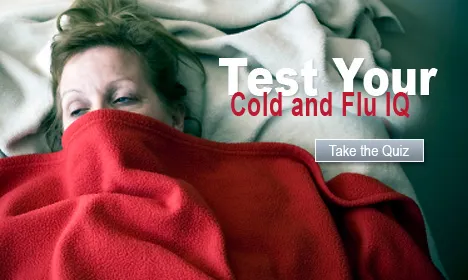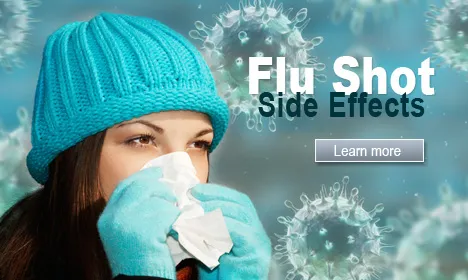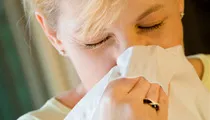Trending Cold and Flu Topics
Anatomy of a Sore Throat Pictures Slideshow
Watch this slideshow and explore the types and causes of a sore throat and learn how to distinguish between sore and strep throat. You'll also find out how to get relief from symptoms such as that raw, scratchy feeling.
Read more about Anatomy of a Sore Throat Pictures Slideshow»
Cold and Flu Quiz
Aches? Pain? Fever? This Cold & Flu Quiz tests your knowledge on the difference between coming down with the common cold and sickness from the flu (influenza virus).
Flu Shot (Vaccine)
Serious side effects from the flu shot are uncommon. Side effects of the injection vaccine may include soreness at the site of the injection, muscle aches, fever, and feeling unwell. The live virus vaccine nasal-spray does not cause severe symptoms.
Flu (Influenza)
Typical flu symptoms in children and adults include a fever (100 F - 103 F), chills, cough, sore throat, stuffy or runny nose, headache, muscle aches, and fatigue. Home remedies to help flu symptoms include OTC medications. Cough drops and cough syrup can be taken to suppress a cough. If a person's symptoms continue worsen, they should seek medical care.
Pregnancy Flu Shot Side Effects and Safety
Changes in the immune system of a woman who is pregnant can make her more sensitive to the flu. If you are pregnant, you should get the flu shot as soon as it's available in your area. The flu vaccine is approved for pregnant women; however, pregnant women should not receive the nasal spray flu vaccine.
Cold & Flu Remedies
Can using a neti pot relieve the sinus pain and congestion associated with cold and flu? Does echinacea shorten the duration of a cold? Watch this slideshow and see which natural cold and flu remedies work.
Related Disease Conditions
 Are You Too Sick to Work?
Are You Too Sick to Work?When you're not feeling well, it may be difficult to decide whether to stay home or go to school or work. Conditions that are very painful may prevent you from working effectively. Anyone with nausea, vomiting, diarrhea, fever, or dizziness should stay home.
 Bronchiolitis
BronchiolitisBronchiolitis is a viral infection of the bronchioles in the lung that usually affects infants and children under the age of two. In infants, RSV is the most common cause of bronchiolitis (inflammation of the bronchial tubes) and pneumonia (infection of the lung tissue).
 Can You Have the Flu Without a Fever?
Can You Have the Flu Without a Fever?Since not every individual experiences all of the flu symptoms, it is possible to have the flu without having a fever.
 Children's Cough Causes and Treatments
Children's Cough Causes and TreatmentsChildren's cough causes include infection, acid reflux, asthma, allergies or sinus infection, whooping cough, and exposure to irritants. Treatment for a child's cough include cough medicine for children over the age of four.
 Chronic Cough
Chronic CoughChronic cough is a cough that does not go away and is generally a symptom of another disorder such as asthma, allergic rhinitis, sinus infection, cigarette smoking, GERD, postnasal drip, bronchitis, pneumonia, medications, and less frequently tumors or other lung disease. </p> <p>Chronic cough treatment is based on the cause, but may be soothed natural and home remedies.
 Cold and Cough Medicine for Infants and Children
Cold and Cough Medicine for Infants and ChildrenThe safety of giving infants and children over-the-counter (OTC) cold and cough medicine is important for caregivers to understand. While there is no "gold standard" recommendation for giving infants and children OTC cold and cough medicine for fever, aches, cough, and runny nose, a few standards have been recommended.
 Cold vs. Flu
Cold vs. FluThough different viruses cause the common cold and influenza, the two respiratory illnesses share many signs and symptoms. Flu symptoms tend to cause more serious, harmful problems than a cold.
 Cold, Flu, Allergy Treatments
Cold, Flu, Allergy TreatmentsBefore treating a cold, the flu, or allergies with over-the-counter (OTC) medications, it's important to know what's causing the symptoms, which symptoms one wishes to relieve, and the active ingredients in the OTC product. Taking products that only contain the medications needed for relieving your symptoms prevents ingestion of unnecessary medications and reduces the chances of side effects.
 Common Cold
Common ColdThe common cold (viral upper respiratory tract infection) is a contagious illness that may be caused by various viruses. Symptoms include a stuffy nose, headache, cough, sore throat, and sometimes a fever.
 Common Cold: Early Signs and 4 Stages
Common Cold: Early Signs and 4 StagesThe common cold or viral rhinitis is an upper respiratory infection caused by several types of viruses. It is one of the most common infectious diseases affecting humans. A common cold may typically follow a certain pattern of progression that has four different stages.
 Effective Home Remedies To Kill a Sore Throat Fast
Effective Home Remedies To Kill a Sore Throat FastLearn what's causing your sore throat, home remedies that can provide relief fast, and what other treatments can help to relieve your symptoms.
 Fever
FeverAlthough a fever technically is any body temperature above the normal of 98.6 F (37 C), in practice, a person is usually not considered to have a significant fever until the temperature is above 100.4 F (38 C). Fever is part of the body's own disease-fighting arsenal; rising body temperatures apparently are capable of killing off many disease-producing organisms.
 Flu (Influenza)
Flu (Influenza)Influenza (flu) is a respiratory illness caused by a virus. Flu symptoms include fever, cough, sore throat, runny nose, headache, fatigue, and muscle aches. The flu may be prevented with an annual influenza vaccination.
 Home Remedies for Sore Throat
Home Remedies for Sore ThroatSeveral home remedies may cure pain and other symptoms associated with a sore throat. However, it is imperative to note that these are not effective against bacterial infections, such as strep throat.
 How Can I Reduce Fever at Home?
How Can I Reduce Fever at Home?Fever is the reaction of your body to fight off bacterial or viral infections. A bacterial infection needs antibiotics whereas a viral one is usually self-limiting i.e., it resolves without treatment.
 How Do I Know If My Sore Throat Is Viral or Bacterial?
How Do I Know If My Sore Throat Is Viral or Bacterial?It's seldom easy to tell the difference between bacterial and viral sore throats. Find out what the differences are and learn some tips for telling them apart. A sore throat is irritation and scratchiness in the throat accompanied by pain that often worsens with swallowing. The most common cause of a sore throat is a viral infection. Rarely, a bacterial infection can cause a sore throat. Antibiotics cannot treat a sore throat if it is caused by a viral infection. Viruses cause about 90% of sore throats; hence, antibiotics should not be used immediately as treatment for a sore throat. A doctor may prescribe antibiotics such as penicillin if a sore throat is caused by a bacterial infection.
 How Do I Stop Sneezing and a Runny Nose?
How Do I Stop Sneezing and a Runny Nose?When you have a cold, certain chemicals (histamines) are secreted by your body; these may lead to sneezing, a runny nose, and watery eyes.
 How Do You Break a Fever Naturally?
How Do You Break a Fever Naturally?Here are 8 home remedies to help reduce a fever without taking medication, which include, staying hydrated, sponging, and proper nutrition.
 How Do You Cure the Flu Quickly?
How Do You Cure the Flu Quickly?Flu or influenza is a common viral disease affecting the respiratory system. This infectious disease is caused by the influenza virus. Most cases of flu are self-limiting and can be easily managed at home.
 How Do You Get Rid of a Cold Overnight?
How Do You Get Rid of a Cold Overnight?Cold symptoms are part of your body’s healing processes. Most of the time, it does not require any help. However, you can get rid of a cold faster, even overnight, by resting, drinking hot fluids, blowing your nose, gargling with salt water, taking a hot shower, using a humidifier and taking OTC pain relievers and decongestants.
 How Do You Treat a Baby With the Flu?
How Do You Treat a Baby With the Flu?The home remedy for flu will depend on the temperature of the baby and on what other signs and symptoms are present with the flu. Flu or influenza is an infectious disease caused by the influenza virus. It affects the respiratory tract (which involves the throat, nose, and lungs) causing symptoms, such as cough, running nose, fever, and difficulty in breathing.
 How Does the Flu Affect the Immunocompromised?
How Does the Flu Affect the Immunocompromised?Influenza, or the flu, is a respiratory illness caused by the influenza virus. It is generally a mild illness that can be treated at home with over-the-counter medications and rest. However, for people with compromised immune systems, the flu can be much more serious. This includes the increased risk of complications, prolonged illness, weakened immune system, and increased risk of death.
 How Long Are You Contagious With the Flu?
How Long Are You Contagious With the Flu?The flu is contagious 1-2 days before symptoms start and up to 5-7 days after symptoms have developed. Young children and people who have weak immune systems may be contagious for longer.
 How Long Does the Flu Last in Seniors?
How Long Does the Flu Last in Seniors?What is the flu? Learn the signs of the flu in seniors and when you need to call a doctor.
 How Long Does Whooping Cough Last?
How Long Does Whooping Cough Last?What is whooping cough and how long does whooping cough last? Learn more about whooping cough and how to recover from whooping cough.
 How Long Is a Cold or Flu Contagious?
How Long Is a Cold or Flu Contagious?Viruses cause the common cold and the flu. Early symptoms and signs for a cold and the flu are similar, however, flu symptoms are typically more severe than cold symptoms. Cold and flu viruses are transmitted typically via coughing or sneezing.
 How to Get Rid of Mucus in My Chest Fast
How to Get Rid of Mucus in My Chest FastWhile some amount of mucus is normal, too much can cause discomfort. Here are 8 ways to get rid of mucus in your chest at home and when to see a doctor.
 How to Stop Coughing
How to Stop CoughingLearn how to stop coughing attacks without medicine at night and at other times naturally. Learn about 19 tips to stop nighttime and persistent cough. Causes of excessive coughing include prescription medications, allergies, cigarette smoke, heart disease, and infections. Home remedies include natural herbs and supplements like ginger, honey, turmeric, and mint.
 Is a Cough Contagious?
Is a Cough Contagious?There are many types of coughs, such as dry cough, wet cough, barking cough, whooping cough, stress-induced cough, acute cough, and chronic cough. A cough is a symptom of an underlying condition or disease. Treatment of cough as a symptom is generally with OTC lozenges and liquids. The cause of the cough will be necessary to treat.
 Is a Sinus Infection Contagious?
Is a Sinus Infection Contagious?Sinus infection (sinusitis) is an infection (viral, bacterial, or fungal) or inflammation of the sinuses. Symptoms of sinus infection are cough, bad breath, coughing up greenish-yellow sputum, sinus headache, and other symptoms of the common cold. Treatments of sinus infection are home remedies to soothe symptoms and antibiotics if the infection is bacterial or fungal.
 Is It Normal to Feel Under the Weather?
Is It Normal to Feel Under the Weather?It is normal to feel under the weather perhaps one time in two months.
 Is Laryngitis Contagious?
Is Laryngitis Contagious?Laryngitis is inflammation and swelling of the voice box (larynx). Causes of laryngitis are viral, bacterial, fungal, strenuous singing or talking, chemical irritants, and other underlying medical conditions. Symptoms of laryngitis are hoarseness, a weak or loss of voice, sore throat, dry throat, a tickling sensation in the back of the throat, or irritated or raw throat. Treatment of laryngitis depends upon the cause.
 Is Sore Throat (Pharyngitis) Contagious?
Is Sore Throat (Pharyngitis) Contagious?Pharyngitis is a contagious infection that can spread from one person to another. Depending on the cause of your sore throat, you may be more or less contagious. Evaluation from a healthcare provider can help diagnose the cause of your sore throat.
 Is Strep Throat Contagious?
Is Strep Throat Contagious?Strep throat is caused by group A streptococcus bacteria. Incubation period for strep throat is 1-5 days after exposure. If strep throat is treated with antibiotics, it is no longer contagious after 24 hours; if it is not treated with antibiotics, it is contagious for 2-3 weeks. Symptoms include fever, sore throat, tonsillitis, white spots or patches on the tonsils, and nausea and vomiting. Diagnosis of strep throat is performed through a rapid strep test.
 Is Tonsillitis Contagious?
Is Tonsillitis Contagious?Tonsillitis is a common infection, especially in kids. Tonsillitis is caused by viruses and bacteria like the flu and herpes simplex virus, and <i>Streptococcus</i> bacteria. These viruses and bacterium are spread person to person. Symptoms of tonsillitis are a yellow or white coating on the tonsils, throat pain, pain when swallowing, and hoarseness.
 Laryngitis
LaryngitisLaryngitis is an inflammation of the voice box (vocal cords). The most common cause of acute laryngitis is an infection, which inflames the vocal cords. Symptoms may vary from the degree of laryngitis and age of the person (laryngitis in infants and children is more commonly caused by croup).
 Sinus Infection vs. Cold
Sinus Infection vs. ColdViruses cause the common cold and most sinus infections. Bacterial and fungal infections may also cause a sinus infection. Signs and symptoms of colds and sinus infections include nasal irritation or dryness, sore throat, stuffy nose, nasal discharge/congestion, sneezing, and cough. Additional symptoms of sinus infections include sinus pressure behind the cheeks or eyes, facial pain when pressure is applied, bad breath, and thick yellow or green mucus. Treatment focuses on symptom relief.
 Sore Throat
Sore Throat<p>Sore throat (throat pain) usually is described as pain or discomfort in the throat area. A sore throat may be caused by bacterial infections, viral infections, toxins, irritants, trauma, or injury to the throat area. Common symptoms of a sore throat include a fever, cough, runny nose, hoarseness, earaches, sneezing, and body aches. Home remedies for a sore throat include warm soothing liquids and throat lozenges. OTC remedies for a sore throat include OTC pain relievers such as ibuprofen or acetaminophen. Antibiotics may be necessary for some cases of sore throat. </p>
 Sore Throat Home Remedies
Sore Throat Home RemediesNatural and home remedies for sore throat symptoms and pain relief include essential oils, licorice gargles, slippery elm leaves, raw garlic, Throat Coat tea, sage, and acupuncture. Typical symptoms of a sore throat include throat pain, coughing, sneezing, fever, and swollen lymph nodes. Sore throats are caused by viral (common cold, flu, mumps), bacterial (tonsillitis, some STDs), toxins, allergens, trauma or injury, or "mechanical causes" (breathing through the mouth).
 Strep Throat
Strep ThroatStrep throat is a bacterial infection of the throat. Signs and symptoms of strep throat include headache, nausea, vomiting, sore throat, and fever. Strep throat symptoms in infants and children are different than in adults. Strep throat is contagious and is generally passed from person to person. Treatment for strep throat symptoms includes home remedies and OTC medication; however, the only cure for strep throat is antibiotics.
![Swine Flu (Swine Influenza A [H1N1 and H3N2]) Swine Flu (Swine Influenza A [H1N1 and H3N2])](jpg/featured-swine-flu.jpg) Swine Flu (Swine Influenza A [H1N1 and H3N2])
Swine Flu (Swine Influenza A [H1N1 and H3N2])Novel H1N1 influenza A virus infection (swine flu) is an infection that generally is transferred from an infected pig to a human, however there have been reported cases where infection has occured with no contact with infected pigs. Symptoms of swine flu are "flu-like" and include fever, cough, and sore throat. Treatment is generally with the antibiotics oseltamivir (Tamiflu) or zanamivir (Relenza).
 Tonsillitis & Adenoids: How Do They Impact Your Health?
Tonsillitis & Adenoids: How Do They Impact Your Health?Tonsillitis is a contagious infection with symptoms of bad breath, snoring, congestion, headache, hoarseness, laryngitis, and coughing up blood. Tonsillitis can be caused by acute infection of the tonsils, and several types of bacteria or viruses (for example, strep throat or mononucleosis). There are two types of tonsillitis, acute and chronic. Acute tonsillitis lasts from 1-2 weeks while chronic tonsillitis can last from months to years. Treatment of tonsillitis and adenoids include antibiotics, over-the-counter medications, and home remedies to relieve pain and inflammation, for example, saltwater gargle, slippery elm throat lozenges, sipping warm beverages and eating frozen foods (ice cream, popsicles), serrapeptase, papain, and andrographism Some people with chronic tonsillitis may need surgery (tonsillectomy or adenoidectomy).
 Upper Respiratory Infection (URI)
Upper Respiratory Infection (URI)An upper respiratory infection is a contagious infection of the structures of the upper respiratory tract, which includes the sinuses, nasal passages, pharynx, and larynx. Common causes of an upper respiratory infection include bacteria and viruses such as rhinoviruses, group A streptococci, influenza, respiratory syncytial, whooping cough, diphtheria, and Epstein-Barr. Examples of symptoms of upper respiratory infection include sneezing, sore throat, cough, fever, and nasal congestion. Treatment of upper respiratory infections are based upon the cause. Generally, viral infections are treated symptomatically with over-the-counter (OTC) medication and home remedies.
 What Are Interesting Facts About the Flu?
What Are Interesting Facts About the Flu?See 9 interesting facts about the flu including the origin, prevalence, contagiousness, vaccines, peak months, duration, complications, home remedies, and more.
 What Are the 3 Stages of Whooping Cough?
What Are the 3 Stages of Whooping Cough?The three stages of whooping cough include stage I (catarrhal), stage II (paroxysmal), and stage III (convalescent). Check out the center below for more medical references on whooping cough, including multimedia (slideshows, images, and quizzes), related disease conditions, treatment and diagnosis, medications, and prevention or wellness.
 What Are the 5 Types of Fever?
What Are the 5 Types of Fever?Fever is a sign that your body is fighting an infection or illness. Learn the five types of fever, signs, what causes fever, how doctors diagnose fever, and what you can do to treat fever.
 What Are the Best Home Remedies for an Upper Respiratory Infection?
What Are the Best Home Remedies for an Upper Respiratory Infection?What is an upper respiratory infection and what causes it? Learn more about upper respiratory infection, the common cold, and how you can treat upper respiratory infections at home. The primary function of the respiratory system is to help you breathe, supplying your body with oxygen and expelling carbon dioxide.
 What Causes Burning at the Base of the Throat?
What Causes Burning at the Base of the Throat?Burning at the base of your throat could result from a number of conditions, such as the cold and flu, tonsillitis, or GERD. Check out the center below for more medical references on throat pain, including multimedia (slideshows, images, and quizzes), related disease conditions, treatment and diagnosis, medications, and prevention or wellness.
 What Causes Shivering?
What Causes Shivering?Shivering is a natural bodily response to various situations. Here are 14 causes of shivering, which include dehydration, temperature drop, and infection.
 What Happens if You Let a Sinus Infection Go Untreated?
What Happens if You Let a Sinus Infection Go Untreated?If you let sinus infection go untreated, it could lead to rare but serious complications such as chronic sinusitis that spreads to the surrounding areas and the larynx, eyes, and brain.
 What Is Adenitis?
What Is Adenitis?Adenitis, a general term for lymphadenitis, is an inflammation of the lymphatic system that results in the enlargement of one or more lymph nodes due to an infection.
 What Is the Best Medicine for Sinus Congestion?
What Is the Best Medicine for Sinus Congestion?Sinus congestion can be relieved with both over-the-counter medications and home remedies. Learn about the best medicines for sinus congestion.
 What Is Vicks VapoRub Good For?
What Is Vicks VapoRub Good For?Vicks VapoRub is the brand name of a popular mentholated ointment manufactured by the American company Proctor and Gamble. This over the counter (OTC) medication is commonly used to manage cold symptoms.
 What Kills a Sore Throat Fast?
What Kills a Sore Throat Fast?How do you kill or fix a sore throat immediately? Learn how long sore throats last and get home remedies for fast sore throat relief. Learn quick and effective ways to ease your sore throat pain.
 When Should I Be Worried About a Fever & Headache?
When Should I Be Worried About a Fever & Headache?Illnesses, diseases, conditions, and infections like cancer, RA, bacterial and fungal infections, encephalitis, meningitis, flu, and colds can cause a headache and fever. Associated symptoms and signs include rash, nausea and vomiting, cough, sweating, neck stiffness, seizure, decreased appetite, and joint pain and swelling. Treatment depends upon the cause but may include antibiotics, antifungal or antiviral drugs, pain-control drugs, decongestants, and cough suppressants.
 Why Do I Wake Up Feeling Nauseated?
Why Do I Wake Up Feeling Nauseated?Here are 12 causes of waking up feeling nauseated in the morning, which include low blood sugar levels, GERD, constipation, and pregnancy (morning sickness).
Multimedia: Slideshows, Images & Quizzes
 A Cold or The Flu? How to Tell the Difference
A Cold or The Flu? How to Tell the DifferenceDiscover the difference between cold vs. flu symptoms. Learn the difference between cold and flu symptoms. Read about cold and flu treatments such as over-the-counter medicines.
 Cold & Flu Quiz: Influenza vs. Common Cold
Cold & Flu Quiz: Influenza vs. Common ColdAches? Pain? Fever? This Cold & Flu Quiz tests your knowledge on the difference between coming down with the common cold and sickness from influenza virus.
 Cold and Flu: The Truth About Hand Sanitizer
Cold and Flu: The Truth About Hand SanitizerHand sanitizers are a convenient way to kill germs. But do they really work? Here's what we found.
 Cold and Flu: What Doctors Do to Boost Their Immune Systems
Cold and Flu: What Doctors Do to Boost Their Immune SystemsHow can you make your immune system stronger? Why not try what the pros try?
 Cold, Fever and Flu Symptoms in Children: Medications and Home Remedies
Cold, Fever and Flu Symptoms in Children: Medications and Home RemediesHow long does a cold last? How long is a cold contagious? Colds and fevers are some of the most common ailments in children. Learn common cold symptoms, treatment options, over the counter (OTC) medicines for cold and fever, home remedies, and how to relieve a sore throat.
 Cold, Flu, & Cough: How to Clean After Illness
Cold, Flu, & Cough: How to Clean After IllnessThis slideshow gives you a room-by-room look at how and what to disinfect after someone in your family has been sick.
 Cold, Flu, & Cough: Symptoms of Immune System Problems
Cold, Flu, & Cough: Symptoms of Immune System ProblemsYour immune system is your main line of defense against infection and illness. Learn the warning signs that yours isn’t working the way it should.
 Cold, Flu, and Cough: How to Avoid Infectious Diseases
Cold, Flu, and Cough: How to Avoid Infectious DiseasesThe right habits will lower your chances of catching an infectious disease. Learn what you can do to help yourself stay healthy.
 Cold, Flu, and Cough: Things That Suppress Your Immune System
Cold, Flu, and Cough: Things That Suppress Your Immune SystemA strong immune system is your best protection against infections and illnesses. Find out what can weaken that defense.
 Common Cold Quiz: Test Your Medical IQ
Common Cold Quiz: Test Your Medical IQTake this quiz to learn the truth behind the infectious, contagious, uncomfortable disease known as the common cold. Test your knowledge of colds; get prevention tips, and learn what you may want to avoid when treating a cold!
 Ear Infections: All About Ear Conditions
Ear Infections: All About Ear ConditionsWhat's that? I can't hear you. Maybe it's tinnitus, or impacted ear wax, or cauliflower ear (yup, that's a thing). Find out what may be ailing your ears in this slideshow.
 Flu Shots: 10 Facts About Flu Shots
Flu Shots: 10 Facts About Flu ShotsWhat are the side effects of a flu shot? Who should get vaccinated? Learn the benefits and risks of vaccination for seasonal influenza. Find out who is eligible for the nasal vaccine, and who is better off with an injection. Get the facts on different types of influenza vaccines and who should get one.
 Home Remedies for Sick Children
Home Remedies for Sick ChildrenHome remedies for sick babies, toddlers, and kids can help with things like colds, flu, cough, sore throat, stuffy nose, fever, and upset stomach. Eating soft foods may help ease kids’ symptoms as well. Cold home remedies for kids can help them feel better fast.
 How to Prevent the Common Cold
How to Prevent the Common ColdWhat home remedies work for the common cold? The common cold is arguably the most common human illness. Learn how long the common cold lasts and treatment for the common cold, and see how often people get colds.
- How Your Immune System Functions
What is the immune system and its function? Your immune system finds and kills germ invaders when you are sick from a cold, the flu, or other diseases like COVID-19. Learn every part of your complex immune system, and what diseases come from an overactive or weak immune system.
 Picture of Influenza Virus
Picture of Influenza VirusThe flu is caused by viruses that infect the respiratory tract which are divided into three types, designated A, B, and C. See a picture of Influenza Virus and learn more about the health topic.
 Sinus Infection (Sinusitis) Symptoms & Treatment
Sinus Infection (Sinusitis) Symptoms & TreatmentSinus infection (sinusitis) symptoms can include headaches, a sore throat, and toothaches. Antibiotics and home remedies can relieve sinus infection symptoms.
 Sore Throat or Strep Throat? How to Tell the Difference
Sore Throat or Strep Throat? How to Tell the DifferenceIs this a sore throat or could it be strep throat? Explore the causes of a sore throat, including strep throat, and learn how to find relief from that raw, scratchy throat pain.
 Strep (Streptococcal) Throat Infection Quiz: Test Your Infectious Disease IQ
Strep (Streptococcal) Throat Infection Quiz: Test Your Infectious Disease IQTake the Strep (<i>Streptococcal</i>) Throat Infection Quiz to learn about causes, symptoms, treatments, prevention methods, diagnosis, and complications of this common infectious disease.
 What Your Nose Says About Your Health
What Your Nose Says About Your HealthDo you smell something no one else does? Is it hard to breathe? Different conditions affect smell and breathing. Use this WebMD slideshow to help you learn what your nose says about health.
 Why Do I Have the Chills? Reasons Other Than Fever
Why Do I Have the Chills? Reasons Other Than FeverChills and fever often come as a combo, but sometimes chills happen with a normal temperature. Find out what could be behind these types of shivers.
Treatment & Diagnosis
Medications & Supplements
- acetaminophen rectal
- acetaminophen/chlorpheniramine
- acetaminophen/chlorpheniramine/dextromethorphan
- acetaminophen/chlorpheniramine/phenylephrine
- acetaminophen/dextromethorphan/phenylephrine
- acetaminophen/dextromethorphan/pseudoephedrine
- acetaminophen/diphenhydramine/dextromethorphan
- acetaminophen/doxylamine/dextromethorphan/phenylephrine
- acetaminophen/pheniramine/phenylephrine
- Afluria Quadrivalent (Influenza Vaccine)
- amantadine (Symmetrel - Discontinued)
- amoxicillin
- aspirin gum - oral, Aspergum
- aspirin rectal
- aspirin/chlorpheniramine/phenylephrine
- azithromycin (Zithromax): For COVID-19
- azithromycin 250/500 mg - oral, Zithromax
- aztreonam - injection, Azactam
- benzonatate
- benzonatate- oral, Tessalon Perle, Zonatuss
- brompheniramine/dextromethorphan/phenylephrine
- Brompheniramine/Dextromethorphan/Pseudoephedrine
- chloramphenicol (Chloromycetin, Econochlor, Ocu-Chlor [These are discontinued brands in the US])
- chlorpheniramine and hydrocodone, Tussionex, TussiCaps, Tussionex Pennkinetic, Vituz
- clarithromycin, Biaxin
- clindamycin - injection, Cleocin
- Clindamycin, Oral (Cleocin)
- clindamycin-oral solution, Cleocin Pediatric
- Cold Medicine and Cough Syrup for Adults
- da qing ye
- dextromethorphan
- echinacea
- erythromycin
- eucalyptus
- expectorant/decongestant/narcotic antitussive/acetaminophen-oral
- FluMist, FluMist Quadrivalent influenza vaccine live intranasal
- Fluzone High-Dose (Influenza Vaccine)
- gatifloxacin-oral, Tequin
- gemifloxacin - oral, Factive
- goldenseal (hydrastis canadensis) - oral
- guaifenesin and dextromethorphan hydrobromide
- guaifenesin and phenylephrine, Sudafed PE Non-Drying Sinus Caplets, (Entex, discontinued)
- Haemophilus influenzae type B vaccine
- hexylresorcinol
- ibuprofen/pseudoephedrine
- influenza A (H5N1) vaccine
- influenza virus vaccine
- influenza virus vaccine - intramuscular, Afluria, Fluarix, Flublok, Flu
- influenza virus vaccine - syringe intradermal, Fluzone
- menthol oropharyngeal
- moxifloxacin (Avelox)
- Mucinex DM (guaifenesin and dextromethorphan hydrobromide)
- narcotic analgesic/aspirin/caffeine - oral
- oseltamivir (Tamiflu)
- pau d’arco
- pectin oropharyngeal
- penicillin V
- peramivir
- phenylephrine nasal
- pneumococcal pediatric vaccine - injection, Prevnar 13
- pneumococcal vaccine (Pneumovax 23, Pnu-Imune 23)
- polypody
- promethazine and codeine, Phenergan with Codeine
- pseudoephedrine (Oral, Afrinol, Sudafed)
- rimantadine
- Side Effects of FluMist (influenza nasal vaccine live)
- Side Effects of Mucinex DM (guaifenesin and dextromethorphan hydrobromide)
- Side Effects of Phenergan with Codeine (promethazine and codeine)
- Side Effects of Relenza (zanamivir)
- Side Effects of Robitussin Ac (guaifenesin with codeine)
- Side Effects of Sudafed (pseudoephedrine)
- Side Effects of Tamiflu (oseltamivir)
- Side Effects of Tussionex (chlorpheniramine and hydrocodone)
- Side Effects of Vicodin (hydrocodone/acetaminophen)
- sodium chloride - intranasal spray (Ocean, Ayr Saline, Humist, NaSal, Little Noses, Ocean)
- star anise
- Tessalon Perles (benzonatate) Side Effects, Warnings, and Drug Interactions
- Tussigon (hydrocodone)
- Xofluza (baloxavir marboxil) Side Effects, Warnings, and Drug Interactions
- zanamivir (Relenza)
- zinc
- Zinc for Colds: Lozenges & Nasal Sprays





